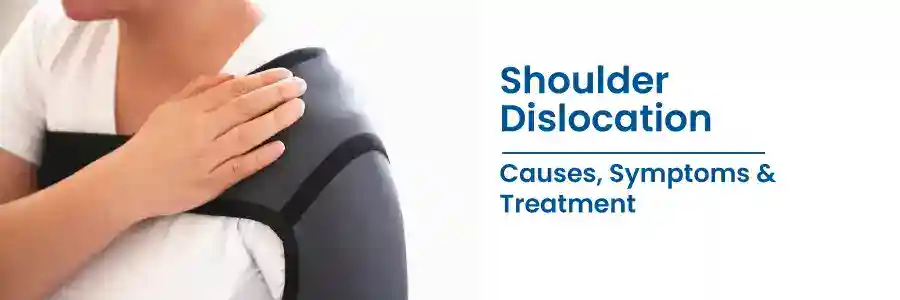- Cardiology 84
- Dermatology 45
- Endocrinology 33
- ENT 16
- Fertility 190
- Gastroenterology 78
- General-Medicine 81
- Gynecology 80
- Hematology 19
- Infectious-Diseases 33
- Neurology 52
- Oncology 34
- Ophthalmology 23
- Orthopedics 69
- Pediatrics 31
- Procedure 23
- Public-Health 144
- Pulmonology 59
- Radiology 8
- Urology 68
- Wellness 161
- Woman-and-child 77

Understanding Shoulder Dislocation: Symptoms, Causes, Treatment
Shoulder dislocation is a common injury that occurs when the upper arm bone pops out of the shoulder socket. This condition can cause significant pain and restrict movement. In this blog, we will explore shoulder dislocation symptoms, causes, treatment options, and when shoulder dislocation surgery may be necessary.
Secure your health with a second opinion. Make informed decisions and book your appointment today!
Get A Second OpinionWhat is Shoulder Dislocation?
Shoulder dislocation occurs when the upper arm bone (humerus) pops out of the shoulder blade socket (glenoid). This injury is common due to the shoulder joint's extensive range of motion, making it susceptible to instability.
Shoulder Dislocation Causes
Several factors can lead to shoulder dislocation:
- Trauma or Injury: Falls, sports injuries, and accidents can force the shoulder out of its socket.
- Overuse: Repeated movements in sports like swimming or tennis can weaken the shoulder joint.
- Genetics: Some people are born with loose ligaments, making them more prone to dislocations.
Shoulder Dislocation Symptoms
Symptoms of a dislocated shoulder include:
- Swelling or bruising
- Inability to move the joint
- A visibly deformed or out-of-place shoulder
- Intense pain
Shoulder dislocation can also result in numbness, weakness, or tingling in the area surrounding the injury, such as the neck or down the arm. The muscles in the shoulder may spasm, exacerbating the pain.
Ready to take control of your health journey? Book your appointment now and start your path towards wellness today!
Book an AppointmentShoulder Dislocation Treatment
Effective shoulder dislocation treatment varies based on the severity and type of dislocation:
- Closed Reduction: A doctor may attempt to manually reposition the shoulder back into its socket.
- Immobilization: A sling or brace can immobilize the shoulder to allow healing.
- Pain Management: Medications like NSAIDs can help manage pain and inflammation.
- Physical Therapy: Rehabilitation exercises strengthen the shoulder muscles and restore range of motion.
- Surgery: In severe cases, surgery might be necessary to repair torn ligaments or stabilize the shoulder joint.
Shoulder Dislocation Surgery
Surgery for shoulder dislocation is considered when:
- Recurrent Dislocations: Frequent dislocations despite non-surgical treatments.
- Severe Tissue Damage: Extensive damage to ligaments, tendons, or bones.
- Chronic Instability: Persistent shoulder instability impacting daily activities.
Types of Shoulder Dislocation Surgery:
- Arthroscopic Surgery: Minimally invasive procedure using small incisions and a camera to repair ligaments.
- Open Surgery: Traditional surgery for more extensive repairs or complex dislocations.
Conclusion
Understanding shoulder dislocation, its causes, symptoms, and treatment options is essential for effective management and recovery. If you suspect a shoulder dislocation, seek immediate medical attention to prevent further complications and ensure proper healing.
Frequently Asked Questions
A shoulder dislocation happens when the ball of the upper arm bone pops out of the shoulder socket.
Shoulder dislocations often occur from falls, sports injuries, or accidents where the shoulder gets pushed or twisted.
Symptoms include intense pain, swelling, inability to move the shoulder, and a visible deformity.
Seek medical help immediately. Avoid moving the arm and try to support it in a comfortable position.
No, a shoulder dislocation needs medical attention to put the bone back in place and prevent further injury.
Surgery may be necessary if there is significant damage to the shoulder structures or if dislocations keep happening.
Yes, once you dislocate your shoulder, you are more likely to dislocate it again, especially without proper treatment.
Strengthening shoulder muscles, using proper techniques in sports, and wearing protective gear can help prevent dislocations.
Your doctor or physical therapist may recommend gentle exercises to strengthen and stabilize the shoulder.
Yes, although less common, children and teenagers can also experience shoulder dislocations, especially during sports.

- Cardiology 2132
- Dermatology 168
- Endocrinology 135
- ENT 97
- Fertility 217
- Gastroenterology 232
- General 478
- General-Medicine 1685
- Gynecology 169
- Hematology 85
- Infectious-Diseases 208
- Neurology 207
- Oncology 345
- Ophthalmology 65
- Orthopedics 187
- Pediatrics 83
- Procedure 72
- Public-Health 209
- Pulmonology 126
- Radiology 13
- Second Opinion 311
- Urology 294
- Wellness 600
- Woman-and-child 447
- Others 10217
Related Blogs
If you have any questions, please fill out the enquiry form or call us, and we will get back to you promptly.
040-68334455